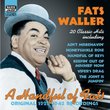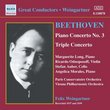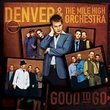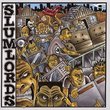| All Artists: Johann Sebastian Bach, Willem Mengelberg, Johannes den Hertog, Royal Concertgebouw Orchestra, Philharmonic-Symphony Orchestra of New York, Piet van Egmond, Jo Vincent, Karl Erb, Louis Van Tulder Title: Bach: St. Matthew Passion Members Wishing: 0 Total Copies: 0 Label: Naxos Release Date: 5/18/2004 Genre: Classical Styles: Opera & Classical Vocal, Forms & Genres, Concertos, Suites, Historical Periods, Baroque (c.1600-1750), Modern, 20th, & 21st Century, Sacred & Religious Number of Discs: 3 SwapaCD Credits: 3 UPC: 636943188026 |
Search - Johann Sebastian Bach, Willem Mengelberg, Johannes den Hertog :: Bach: St. Matthew Passion
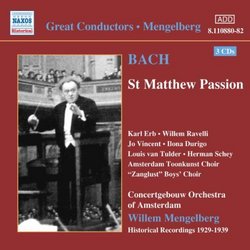 | Johann Sebastian Bach, Willem Mengelberg, Johannes den Hertog Bach: St. Matthew Passion Genre: Classical
|
Larger Image |
CD DetailsSimilar CDs
|
CD ReviewsThe Legendary 1939 Mengelberg 'St. Matthew Passion' J Scott Morrison | Middlebury VT, USA | 05/22/2004 (4 out of 5 stars) "This performance is legendary for a number of reasons. Willem Mengelberg (1871-1951), the long-time conductor of Amsterdam's Concertgebouw Orchestra and now known primarily because he was the first champion of Mahler's music outside Austria and Germany, had been conducting a yearly performance of Bach's mighty 'St. Matthew Passion' since 1899. This performance, broadcast over Dutch Radio on Palm Sunday of 1939, was to be his last. The horrors of World War II were about to rock Europe and his country was soon occupied by German troops. (Indeed, one of the soloists in this performance, bass Herman Schey, a Jew, spent the duration of the War in hiding inside Holland.) This recording was the first to be made in its original German; a version in English, conducted by Serge Koussevitsky, had been made in Boston in 1937 but was in horrible sound. Also, this recording was made using an unusual process, the so-called Philips Miller system that used a black-coated celluloid film which was etched in the recording process by a sapphire stylus and then read back optically; a similar process had been in use in the film industry for a few years. The sound obtained was an advance on the usual recording processes then commonly in use. Indeed, a technically adequate recording made using the Philips Miller technique sounded as good as audiotape recordings made as late as the 1950s. It allowed for longer takes and obtained a much wider dynamic range than was common in the 1930s. This transfer, made by the redoubtable Mark Obert-Thorn, used pristine Dutch pressings. The performance presented here is controversial in these days of so-called authentic Baroque performance practice. It is in the grand manner that was common in its day. The chorus is huge, the orchestra is the full Concertgebouw. The manner of the performance is Romantic, even elephantine, but there is a grandeur and reverence that still makes its effect in these more 'enlightened' days of fleet performances with smaller forces. It may be helpful to think of this performance as operatic. There is no question that the points of the story of the Passion are made in dramatic fashion here. The cast of soloists is outstanding. Karl Erb is a dramatically apt Evangelist. Bass Willem Ravelli sings a manly and dulcet-voiced Jesus. The solo quartet - Jo Vincent, soprano; Ilona Durigo, contralto; Louis van Tulder, tenor, and Herman Schey, bass - are quite effective. The chorus, the combined Amsterdam Toonkunst Choir and the Zanglust Boys' Choir, are spectacular; my only complaint is that the forces are so large that when the chorus bursts in with the crowd interjections it fair makes one jump out of their chair. Mengelberg conducts with complete control, taking quite slow tempi much of the time while molding phrasing and dynamics in echt-romantisch style. There are some small cuts in the complete score. The largest cut begins at the middle of No. 49 and jumps to No. 54. No sung texts are included. I don't see this as a significant problem as I cannot imagine that this will be anyone's only recording of the Passion. I suspect this release will be valuable primarily to Bach enthusiasts, Mengelberg collectors (of which there is a growing number these days), and people with a musicological bent. But make no mistake, this is an extremely moving performance of this masterwork. I will admit that I am less than sold on current performance practice of this and similar works; maybe it's because I'm of a certain age and came to love these works in recordings that are now considered old-fashioned. So be it; I know I am not alone in this feeling. Included in this 3CD set are also recordings, again in the old-fashioned manner, of Mengelberg conducting the Orchestral Suite No. 2 in B Minor, BWV 1067 (rec. 1931), Telico's arrangement of the 'Air for the G String,' from Suite No. 3, BWV 1068 (rec. 1938), and the Concerto in D Minor for Two Violins, BWV 1010 (with Louis Zimmermann and Ferdinand Helman, violinists; rec. 1935), all with the Concertgebouw. Also included is a rarity, Mahler's arrangement of the Air for the G String played by the New York Philharmonic under Mengelberg and recorded in 1929, the last year he was their conductor.TT: 3CDs, 3:27:26Scott Morrison" A New and Revolutionary Way to Hear Bach John Wood | Vermont | 01/24/2007 (5 out of 5 stars) "Having grown up on sterilized, so-called "authentic" performances of Bach, I always found him cold and uninteresting. Then after reading the above reviews, I chanced it and bought Mengelberg's Bach. And it was a revelation. This was Bach with love, Bach with emotion, Bach with the greatest depth of feeling, Bach that touched my heart and brought me to tears. I refuse to believe that there is any single "authentic" way to perform Bach anymore than that there is one "authentic" way to worship. The fanatics are not just out there in religion but also in musical performance. I judge a person by his actions, by what he or she does, by what she or he accomplishes regardless of the person's professed faith. And I judge musicians in the same way. Move me, touch me, bring me to tears, and make me know I am in the presence of great art, but don't preach to me a single path to musical salvation, especially when it is sterile and unfeeling. In additon to the "Passion," there are other Bach performances on here that are equally moving, equally wonderful. This set was a revelation. As philosopher Frederick Turner pointed out in THE CULTURE OF HOPE, "Sometimes the present creates the future by breaking the shackles of the past; but sometimes the past creates the future by breaking the shackles of the present." Here is a revolution--in terms of today's moribund way of performing Bach and early music--and I would only hope that some contemporary musicians might try to break some of "the shackles of the present" and return Bach's humanity to him. " A major addition to the Naxos Historical Catalogue. John Austin | Kangaroo Ground, Australia | 06/08/2004 (5 out of 5 stars) "Amongst the vast legacy of recordings from Mengelberg's Amsterdam years, this one had until now eluded me. Well, the wait was worthwhile! I doubt that the St Matthew Passion recording, wonderfully vivid for 1939, has ever sounded as well as in this 2004 remastering by Mark Obert-Thorn. You'll be aware of a few patches of blasting in the opening chorus, and a few clicks thereafter, but you'll soon feel comfortably enveloped in the grand ambience of the Amsterdam Concertgebouw. The recording is especially kind to the choir.So much for the recording quality, what of the performance? Commitment, sincerity, grandeur and reverence - words like this typify it. Don't expect metronomic totality to be sustained in each item. Indeed, so many are the kinks and bends in the music's flow that you'll wonder how such large forces directed by one diminutive conductor could maintain such perfect ensemble. Those who favor contemporary styles of Bach performance will need to forget all that. Repeated hearings might show that behind Mengelberg's idiosyncracies is a strong understanding of a great event and a commitment to making Bach's music reveal it directly.Complete St Matthew Passion performances were rare in the 1930s. Bruno Walter was one conductor who later regretted that he had conducted "cut" versions. This one lasts for about two and three-quarter hours. All Mengelberg's other Bach recordings are added to fill the third CD."
|

 Track Listings (29) - Disc #1
Track Listings (29) - Disc #1